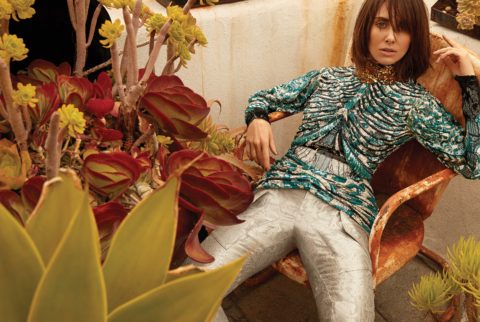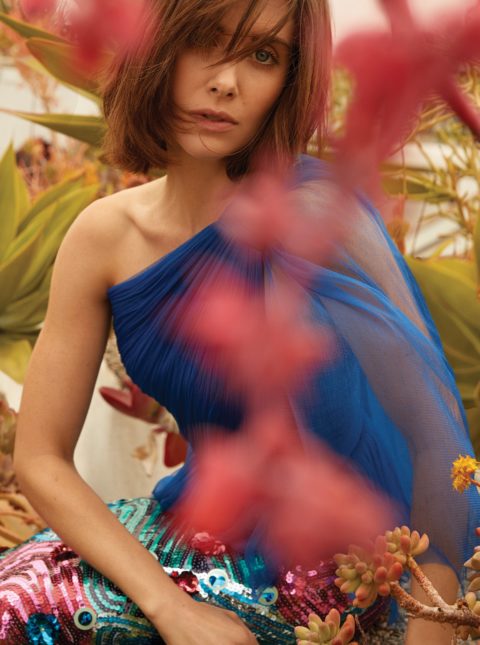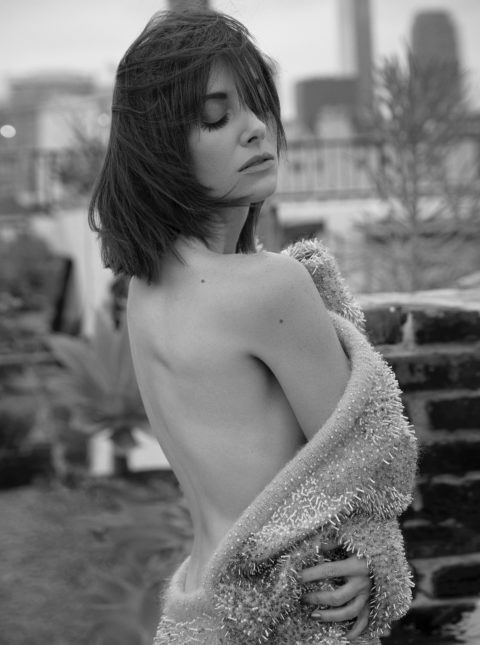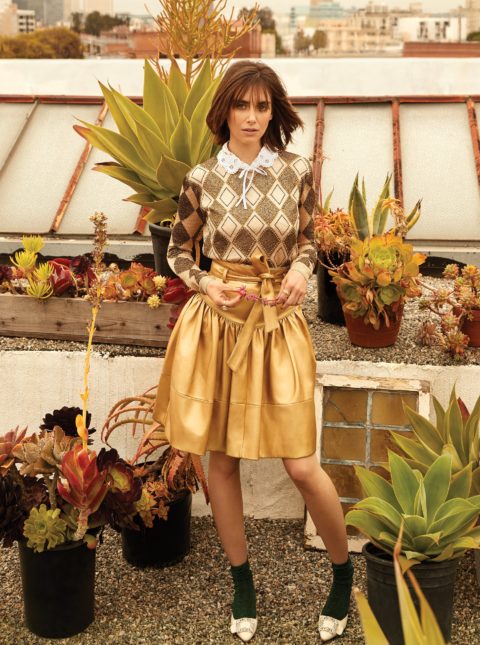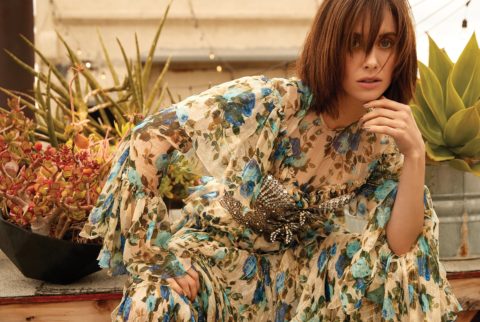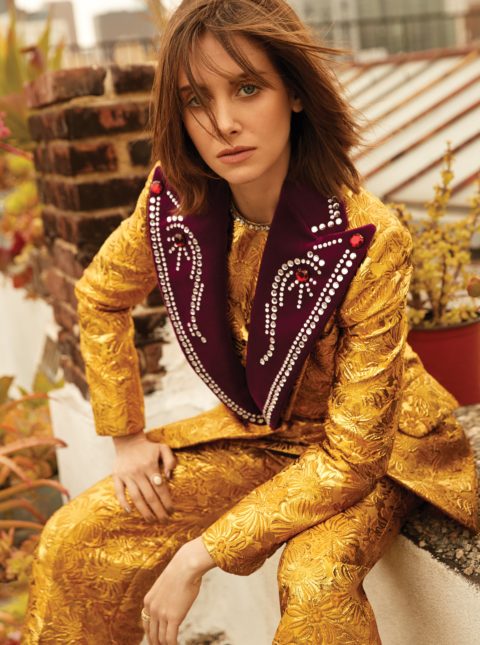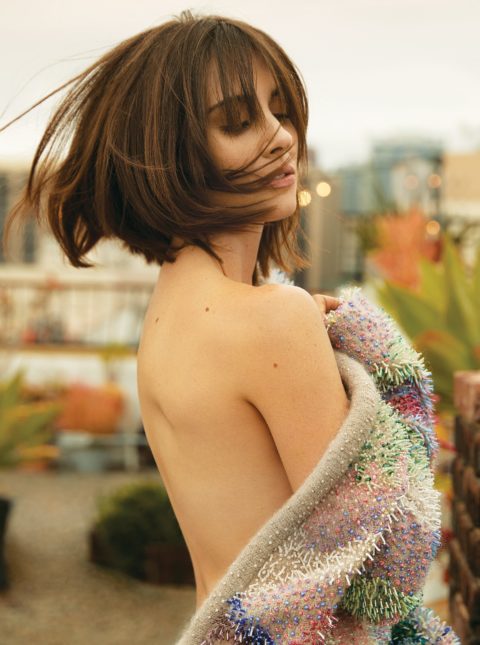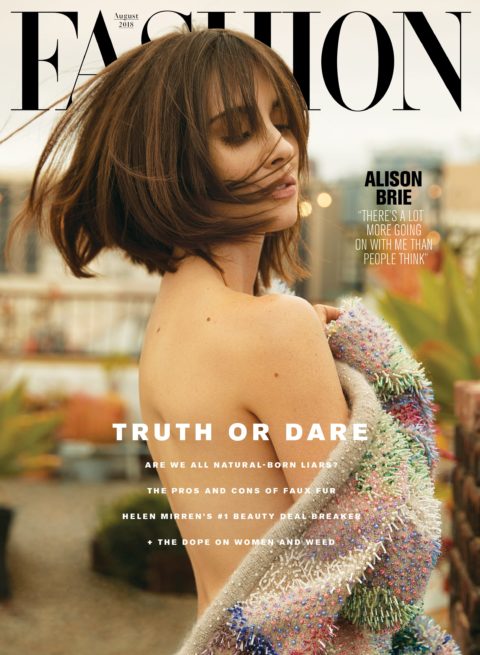GLOW’s Alison Brie Doesn’t Want to Be Called a Comedic Actress
The room is dark, illuminated only by flashes of coloured arcade lights snaking across the ceiling. The instructor is shouting encouragement over crunchy EDM. I’ve never been to a Rise Nation session, but the concept is similar, I assume, to a spin class—only instead of stationary bikes, there are climbing machines that, in the low light, look a little like high-tech easels.
I had booked a climbing machine close to Alison Brie, whom I am here to meet and who, I would find out later, had planned on explaining the contraption to me so I wouldn’t feel lost. But now, owing to a fundamental ignorance of Los Angeles’s size and geography and an aggressively lackadaisical taxi driver, I’m late and it’s impossible to see where she is in the laser-tag dark. I hop onto the climber closest to the door and try to get into the rhythm of the class.
I am very bad at this. At least once during every song (which is apparently how time is measured in fitness classes), usually when the instructor is exhorting us to dig deep, I stop to rest. I take these opportunities to scan the room for Brie. No luck. Instead, as is the case whenever you are failing at something, I look around for people who are doing worse than I am. Definitely not the woman in front of me. She is a machine—small, strong, seemingly unstoppable. She hits every beat and every combo the instructor throws at us. I fiddle with my machine, seeing if maybe it’s on, like, the expert setting. It is not. The woman in front of me is on the same machine as I am, hearing the same orders as me, only she’s Daft Punk-ing me: She’s harder, better, faster, stronger.
I learn two things once the lights come up at the end of the class. The first is that if performance were rated by the amount of sweat pooled at the base of one’s machine, I would be the best climber-dancer in the room. The second is that the superhero in front of me is Alison Brie.
“One other time, I had a journalist go for a hike with me,” she tells me, over an L.A.-appropriate post-workout breakfast, after I’ve finally, mostly, recovered. “She threw up. So I feel like I’m really destroying journalists’ lives, one at a time. But you know who needs to be cut down to size? Print journalists.”
“If you need a headline, that would be the headline of my life: ‘There’s a Lot More Going on With Me Than People Think.’”
With that history (one more fallen writer and it’s a trend), it might be tempting to conclude that Brie doesn’t know her own strength. That would make for a convenient analogy for an actress who seems so down-to-earth. But it doesn’t work here. Brie knows exactly how strong she is. The problem—if you can say that a career that includes three critically adored, culturally significant shows (Mad Men, Community and GLOW) has a problem—is that we still don’t understand how powerful Brie is. “If you need a headline,” she says, “that would be the headline of my life: ‘There’s a Lot More Going on With Me Than People Think.’” If an actress is always surprising us with her depth, talent and/or range, maybe that says more about the audiences’ expectations than it does about the actress.
So let me correct our expectations with this prediction: A time will come—and it will come soon—when Alison Brie will be considered one of the best actresses of her generation. If we let her.
Part of what’s keeping Brie from being known as a dominant force in Hollywood is the nature of Hollywood itself. Audiences are so fragmented and have so many options that it’s hard to become super-famous without playing a superhero. While the television projects she’s been a part of have been—and continue to be—among the most lauded of the past 10 years, they didn’t exactly bring in Big Bang Theory numbers. Brie played the innocent, if a bit unstable, Annie in the cult comedy Community at the same time as she was bringing nuance and power to the role of Trudy Campbell on Mad Men. These days, along with playing the frustratingly ambitious, morally complicated lead actress-turned-wrestler in GLOW (now in its second season on Netflix), she is one of the main voices in the not-for-children-or-the-faint-of-heart comedy cartoon BoJack Horseman.
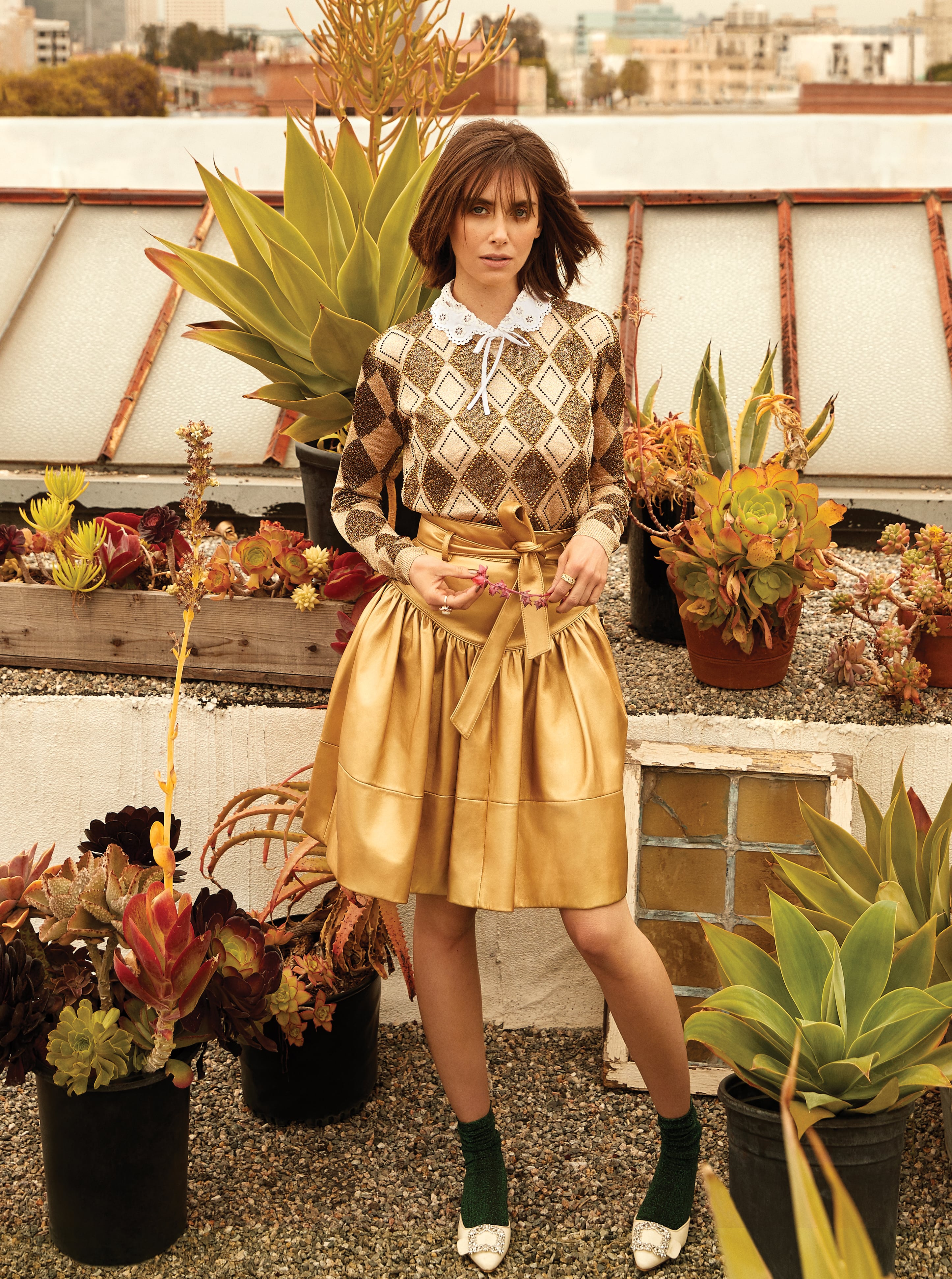
But even among people who do recognize her—she did star in two Oscar-nominated movies this past year, after all (The Disaster Artist, along with her husband, Dave Franco, and The Post, with Meryl Streep)—she isn’t always remembered for the right things. “The biggest misconception across the board is that I’m a comedy actress, and it drives me crazy,” she explains. “Which is weird because I don’t want to begrudge that title in a way that implies I hate the genre. I don’t. I love it! But, to me, there’s more to me. There’s untapped resources you guys don’t even know about.”
There is a persistent rumour perpetuated by the mainstream media that Brie is a goddamned delight to talk to. I can confirm that this rumour is 100 per cent true. She is warm, open and funny. She riffs with you. She is naturally, effortlessly charming. What makes some famous people seem nice is how they shed the awkward interview dynamic and power differential like an overcoat—but you never forget that that coat is close by. Brie talks with you like she’s never worn that coat in the first place. This is not a groundbreaking observation, but its persistence is noteworthy. She really is that cool.
“The biggest misconception across the board is that I’m a comedy actress, and it drives me crazy.”
And so it’s not that I wish she were less kind but that, cynically, I wonder if some people are so distracted by her charm that they aren’t able to fully appreciate the depth of her talent. So here’s another prediction: What will happen with Brie will be a repeat of how she scored the role of Ruth on GLOW, only on a larger, permanent scale.
She had to fight for GLOW. But when you know how strong you are, you get a sense of which fights you’re going to win. That doesn’t mean it was easy.
“I almost can’t even define why, but certain things you just read and you’re like, this is my role,” she says. “Maybe it came from having felt slightly misunderstood in my career—although I still sort of feel that way everywhere outside of GLOW—but I just had this drive to fight for this character, and I knew exactly what I wanted to do with her. I would go into every audition superconfident with all these amazing decisions and then leave the auditions and go cry in my car because our producers, as much as I love them now, were very cold and awkward in the room while I was auditioning.”
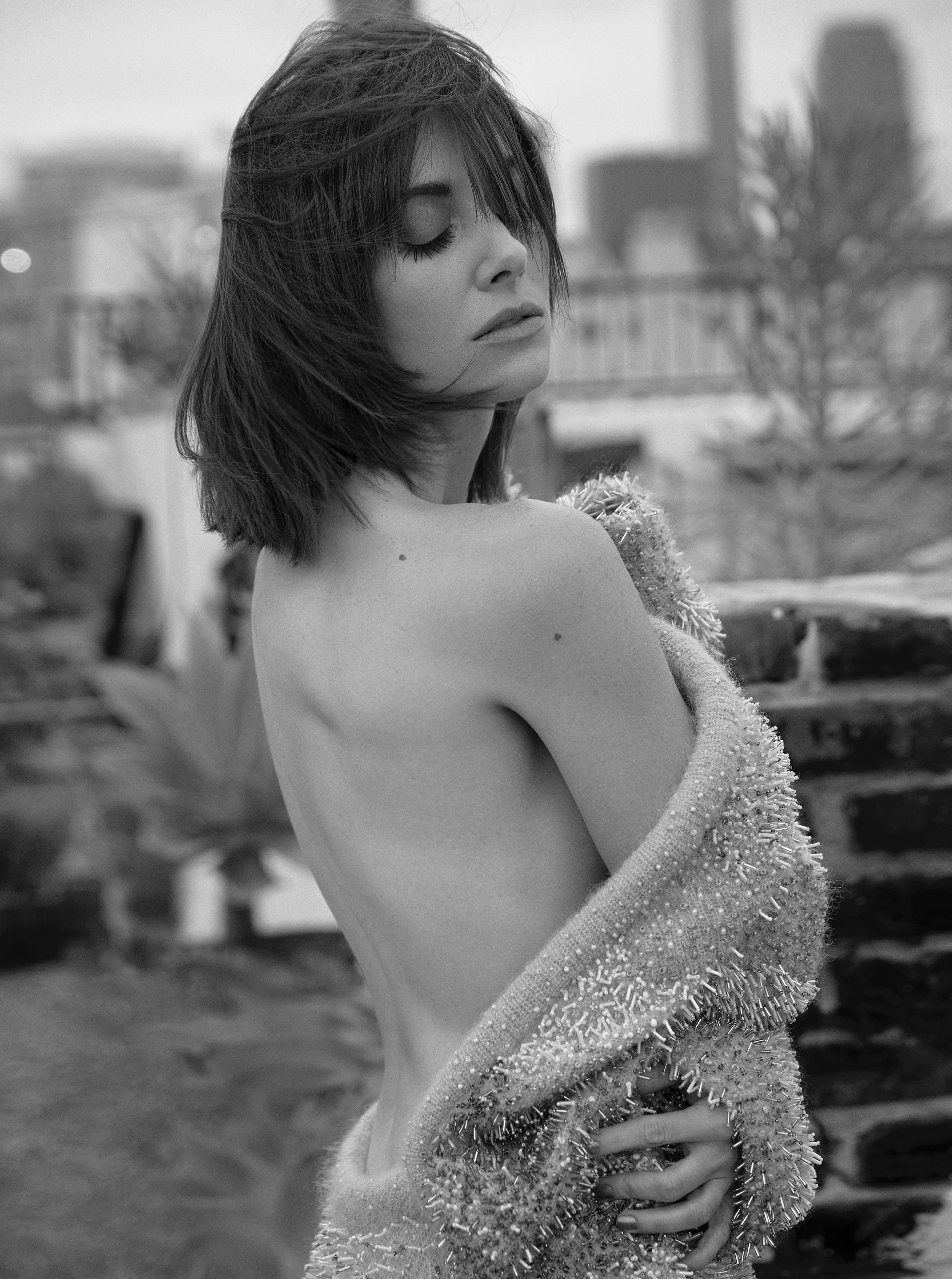
See, back when her career was new, after she trained at the California Institute of the Arts (she spent a semester at Glasgow’s Royal Scottish Academy of Music and Drama), Brie took classes in Los Angeles on how to act for the camera. They probably helped her score her roles on Mad Men and Community, but they also changed how she thought about herself.
“I would go into every audition superconfident with all these amazing decisions and then leave the auditions and go cry in my car.”
“You get out of college and everyone tells you to define yourself now: ‘Put yourself in a box before other people do and then you’ll work more.’ I was learning good tools that I would continue to use, but my individuality was at stake because a lot of work in this industry is people saying ‘Don’t trust what you think—just be the way these people want you to be.’ And you have to let go of that.”
So she did and eventually convinced GLOW’s producers of what is obvious now: There really wasn’t anyone else who could tackle that role better than her.
Maybe a bit more on GLOW is in order because this is the kind of marriage between actor and role that makes other marriages question the strength of their relationships. “I think, for me, working on GLOW—I feel like I’m tapping into every part of myself,” she says. I suspect that an actor can’t create a fully realized character if they don’t know themselves first. Which is why this role feels like a culmination—a kind of crescendo of all of Brie’s talents, including, as she says, some we haven’t seen yet.
Ruth is aggressively ambitious and almost desperate. Unable to find work as an actress—unable to be seen, really—she throws herself into the opportunity to become a wrestler and de facto leader of the other women. There’s comedy (which we already knew Brie was good at) and the kind of moral ambiguity that actors relish. But, actually, it’s in the more subdued, everyday Ruth-ness that Brie is most surprising. She displays this transformative Theronian ability to be believably plain. Yes, it has to do with makeup—or the lack thereof—and the ’80s fashions she gets (has) to wear, but there’s something internal, too. A switch of focus in the eyes—like something is broken inside and we can only just barely see it. It’s not there when we’re talking over smoothies, and it certainly isn’t there later that day, when she’s dressed head to toe in golden Gucci. Because it’s in Ruth, not Brie.
“My individuality was at stake because a lot of work in this industry is people saying ‘Don’t trust what you think—just be the way these people want you to be.’ And you have to let go of that.”
Now the downside of saying that Brie and Ruth represent the platonic ideal of an actor inhabiting a role is that one might infer the two are similar, that playing Ruth doesn’t require much of a stretch. But it’s more like a recipe. Brie brings all the right ingredients for this particular dish—including physical strength, which I’ll appreciate even more as my legs stay stiff for days after my Rise Nation experience.
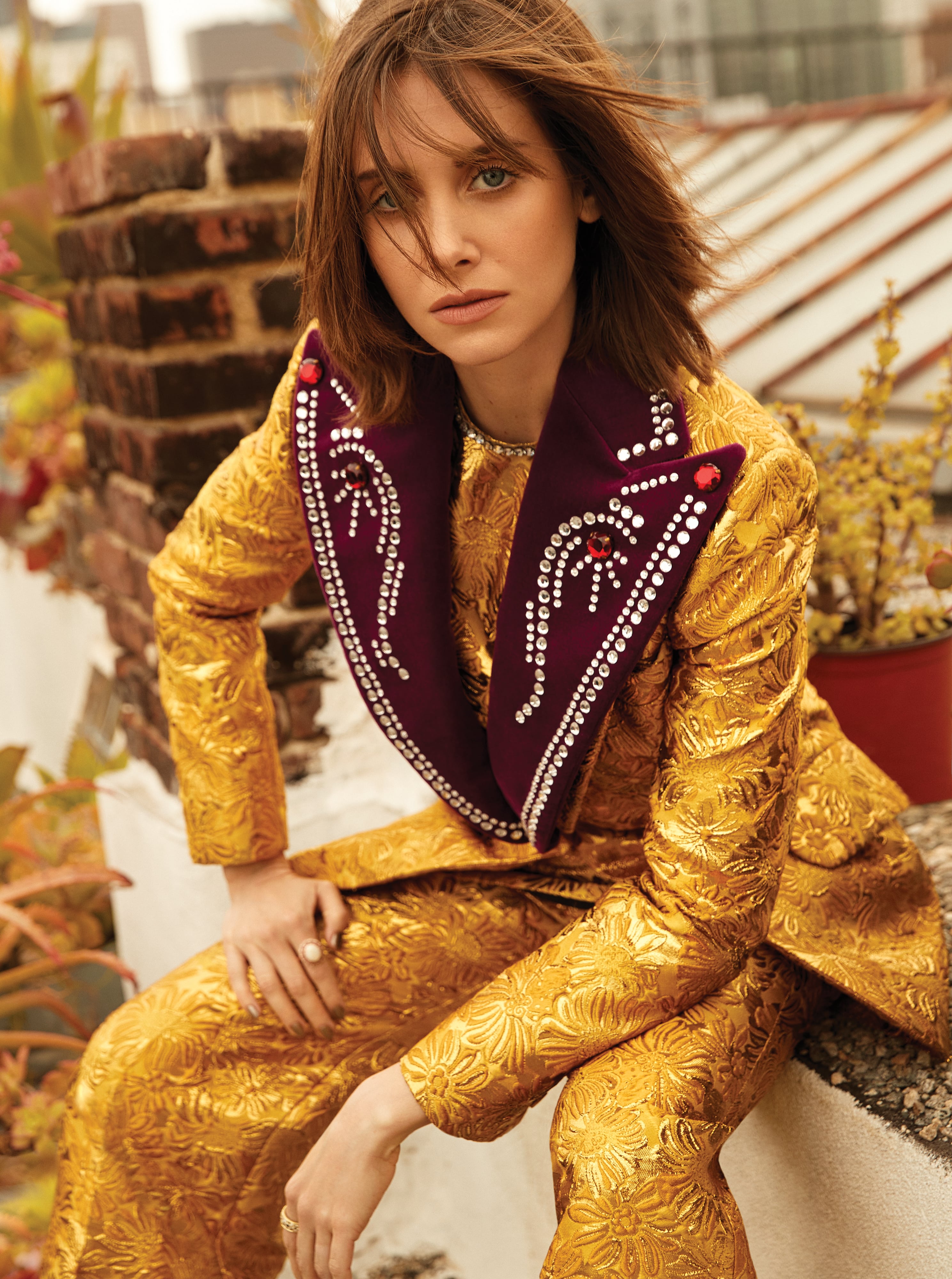
Actually, the physicality of the role—and Brie’s commitment to it—deserves mentioning. Her body has often been a factor in her career (not surprisingly, she is quite popular with men on the Internet), but it’s different this time. “We work for women and for a show that’s so much about our bodies, and yet we’re never sexualized,” she explains. “That’s not a priority of the show. And it certainly is in sync with how I feel as a person in terms of having little interest in having to prove my own sexiness.” And because she is Brie—and a goddamned delight to talk to—she continues: “Although, even right now, in this explosive moment, there is still a thing where we’re like, ‘Yeah, I’m taking back my body, and I don’t have to be sexy… But I’m also 35, and do you still find me sexy? Because I just want to make sure.’ It’s like as much as we want to think everything’s changed, I still have a fear about wanting to be seen that way enough to continue to work.”
“There is still a thing where we’re like, ‘Yeah, I’m taking back my body, and I don’t have to be sexy… But I’m also 35, and do you still find me sexy? Because I just want to make sure.’”
Of course, the most striking difference between Ruth and Brie is likeability. “Playing Ruth, I adore her and sympathize with her,” says Brie. “And obviously I must. I have to understand everything she’s doing and why. Where this is a challenge is for audiences; there’s a myriad of reactions. Some people love her. Some people find her cloying. Some people just hate her and think she’s awful but still want to watch the show.”
I was looking for an analogy earlier, back when we were in the dark, sweating and panting, climbing and climbing and climbing without actually getting anywhere. And while there would be a certain amount of poetry if I used that to describe Brie’s situation, it would also be way too sad and untrue, not to mention pretentious and dumb. Instead, consider how the day ends: Brie is dressed in a resplendent gown, standing on a roof that allows you to see farther across Los Angeles than your eyes can focus on. She’s already on top—where her followers and fans know to find her—but soon that whole city below will look up. And then she’s going to need a taller roof.
The post <em> GLOW’s</em> Alison Brie Doesn’t Want to Be Called a Comedic Actress appeared first on FASHION Magazine.
